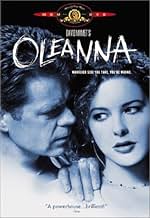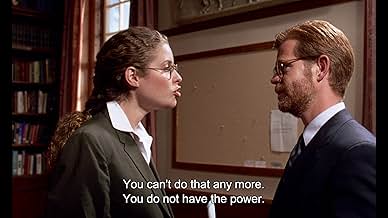IMDb रेटिंग
6.5/10
3.8 हज़ार
आपकी रेटिंग
अपनी भाषा में प्लॉट जोड़ेंWhen a student visits her professor to discuss how she failed his course, the discussion takes an awkward turn.When a student visits her professor to discuss how she failed his course, the discussion takes an awkward turn.When a student visits her professor to discuss how she failed his course, the discussion takes an awkward turn.
- पुरस्कार
- कुल 1 नामांकन
Diego Pineda
- Quarterback
- (बिना क्रेडिट के)
Scott Zigler
- Clerk in Copy Shop
- (बिना क्रेडिट के)
फ़ीचर्ड समीक्षाएं
One general misunderstanding (in my opinion) of Mamet is that he tries to write realistic dialog. In Oleanna, Mamet seems to want to speak directly through each character in a very academic verse which is well suited to the film/play. The issues of sexual misconduct and the way perspectives differ between men and women make this an interesting journey. And if you are a Bill Macy fan, you will like the movie.
Unique, hyper-real film where the dialogue is the main plot - and what a rivetting plot it is. I was very skeptical about Oleanna, and was really resistant to it - but was very surprised to find myself succumbing to it. If you love language, and know enough language, Oleanna will be a joy for you: because the dialogue is loaded with jokes about dialogue. You'll be able to pick the places where Bill Macy is saying non-words, pretentious words or jargons in his monologues - and notice where somebody is talking ambiguously, or not saying anything at all.
Its about words, talking and meaning. So there are lots of words for good reason.
Its very dialoguey dialogue: not the kind of things people say, but the kind of things writers write. Reminiscent of the verbal gymnastics of Samuel Beckett, and the twisting meanings of Catch-22. Or perhaps the comedic pretentiousness of Hal Hartley. Meaning is controlled by the powerful - that's the key. Whoever controls the conversation, the language, in this movie - controls the situation. So everything is either ambiguous or figurative. Mainly, the exact things the two say are not what's key. Its which one of them is talking.
The performances - well, Macy at least - are in an appropriately hyper-real tone to suit the hyper-real dialogue. The girl is not very good, but this is still a masterpiece of language. Its static, centring on two characters and one room, but for good reason - to put the words centre stage. I'm so shocked that i just watched a movie with two characters and one room, and was not only not bored once, but hanging on each word and found that the time flew by.
The moral of the story is that things are bound to go wrong if you talk to somebody for the length of an entire movie. You're bound to go nuts. The viewer is bound to go nuts just listening to William H Macy in the first half-hour of the movie - you'll be amazed that purely talking to someone, using words, can make you feel that you're trapped, that you can't win or even escape.
Quite brilliant, really.
8/10. Essential viewing. I never knew dialogue held this power. A unique discovery.
Its about words, talking and meaning. So there are lots of words for good reason.
Its very dialoguey dialogue: not the kind of things people say, but the kind of things writers write. Reminiscent of the verbal gymnastics of Samuel Beckett, and the twisting meanings of Catch-22. Or perhaps the comedic pretentiousness of Hal Hartley. Meaning is controlled by the powerful - that's the key. Whoever controls the conversation, the language, in this movie - controls the situation. So everything is either ambiguous or figurative. Mainly, the exact things the two say are not what's key. Its which one of them is talking.
The performances - well, Macy at least - are in an appropriately hyper-real tone to suit the hyper-real dialogue. The girl is not very good, but this is still a masterpiece of language. Its static, centring on two characters and one room, but for good reason - to put the words centre stage. I'm so shocked that i just watched a movie with two characters and one room, and was not only not bored once, but hanging on each word and found that the time flew by.
The moral of the story is that things are bound to go wrong if you talk to somebody for the length of an entire movie. You're bound to go nuts. The viewer is bound to go nuts just listening to William H Macy in the first half-hour of the movie - you'll be amazed that purely talking to someone, using words, can make you feel that you're trapped, that you can't win or even escape.
Quite brilliant, really.
8/10. Essential viewing. I never knew dialogue held this power. A unique discovery.
William H. Macy plays a professor, and Debra Eisenstadt plays a student who needs an A in the class she is taking from him. They argue as to why she should or shouldn't get an A. In the course of their arguing, the student finds cause to charge the professor, who is up for tenure, with sexual harassment and takes her case to the tenure committee.
The movie runs about an hour and a half. It was slow going, but as I was about to flip away from it (watching it on cable), I checked how long it had to go, and it was about half-way through. I figured, oh well, there's still some Canadian Club I need to get rid of, and tomorrow's a holiday, so I stuck with it. And I'm glad I did.
It is not a good movie, and maybe not even a very good play. Mamet's direction is ultra-stagy, even more declamatory than live theater would normally allow for, let alone a movie. For about an hour and a half, the actors hurl complete sentences and big chunks of paragraphs at one another.
Are Mamet and the actors really that insensitive to the conventions of film? Not likely. I think he chose that artificial manner in order to distance the audience from the characters and bring the ideas to the foreperhaps in the same vein as Bertolt Brecht's notion of "epic theater".
This is not so much a movie or a play as it is a staged philosophical dialogue. It examines the power relationships between man and woman, teacher and student. When the student comes to the professor to reveal the case she has built against him, it shows how words and deeds in one context can be given a whole different thrust and meaning when used to "build a case". Or are they really that different? Perhaps her case focuses and explicates the real underlying relationship of those words and deeds. Those are the kinds of questions Mamet raises, and I think it is a masterful exploration.
But is it a movie? Well, it is certainly dramatic, if stilted, and the dénoument is devastating. It may not be a good movie, but Mamet knew exactly what he was doing, and I'd watch it again.
The movie runs about an hour and a half. It was slow going, but as I was about to flip away from it (watching it on cable), I checked how long it had to go, and it was about half-way through. I figured, oh well, there's still some Canadian Club I need to get rid of, and tomorrow's a holiday, so I stuck with it. And I'm glad I did.
It is not a good movie, and maybe not even a very good play. Mamet's direction is ultra-stagy, even more declamatory than live theater would normally allow for, let alone a movie. For about an hour and a half, the actors hurl complete sentences and big chunks of paragraphs at one another.
Are Mamet and the actors really that insensitive to the conventions of film? Not likely. I think he chose that artificial manner in order to distance the audience from the characters and bring the ideas to the foreperhaps in the same vein as Bertolt Brecht's notion of "epic theater".
This is not so much a movie or a play as it is a staged philosophical dialogue. It examines the power relationships between man and woman, teacher and student. When the student comes to the professor to reveal the case she has built against him, it shows how words and deeds in one context can be given a whole different thrust and meaning when used to "build a case". Or are they really that different? Perhaps her case focuses and explicates the real underlying relationship of those words and deeds. Those are the kinds of questions Mamet raises, and I think it is a masterful exploration.
But is it a movie? Well, it is certainly dramatic, if stilted, and the dénoument is devastating. It may not be a good movie, but Mamet knew exactly what he was doing, and I'd watch it again.
This film is basically about a student who cannot accept she's failing class and decides to ruin her teacher's life by framing him. Around this basis, a quite witty dialogue is unfolded, which makes the movie intellectually stimulating and powerful. Additionally, it depicts the invalidity of some axioms of both professor and student community and portraits how people manipulate the truth to serve their personal interests. A very strong point is how pompous and cliche arguments about void pseudo-liberties alienate people from truly disastrous and desperate situations. As I see from other reviews, the play was much better, but unfortunately we didn't have the chance to see it here in Greece yet, so my first impression of Mamet's work was from this movie.
The tag line of this movie is that "whichever side you take, you're wrong," is itself wrong. There clearly is a wrong and right side. If we were to sit Catherine McKinnon and Andrea Dworkin down and show them only the first half of the movie, even they would be pressed to find any sexual harassment (let alone rape). We would find a self-absorbed professor, and knifing student (whose clipped speech, and apparent dumbfoundedness is belied later when she fabricates, embellishes, and spins the truth for her PC ends). If being self-absorbed is enough to get one fired and falsely accused of rape, then Mamet's lesson must be that the feminist orthodoxy has gone too far.
क्या आपको पता है
- ट्रिवियाDavid Mamet's script was heavily criticized as sexist. He defended himself against this allegation in (Guardian supplement) (UK) 8 April 2004, pg. 8-9, "'Why can't I show a woman telling lies?'"
- गूफ़When Carol leaves John's office after their second meeting, shouting "Help!", the shadow of the camera covers the door.
- इसके अलावा अन्य वर्जनThere is a version of the movie circulating in Australia, in a series of videos along with other David Mamet films including "A Life in the Theater". This particular copy of the film is timecoded. In that version, after Carol tells John not to call his wife "baby," (thus sending him into a torrent of rage), and he slaps her arm and grabs her, screaming a sexual expletive and raising a chair above her head, the door to the hallway swings open and a number of people stand in the hallway, observing the fight and thus hopelessly damning John. In the version now appearing on The Sundance Channel (10/05), the expletive is unchanged but he never lifts the chair and the door never opens; aside from a final exterior shot of the school, the film ends with Carol (Eisenstadt) having collapsed on the floor of John's office, and John sitting in his chair, his head buried in his hands.
- साउंडट्रैकLong Ago And Far Away
Words by David Mamet
Music by Rebecca Pidgeon
Soloist: Steve Goldstein (as Steven Goldstein)
© Copyright 1994 Dwight Street Music
टॉप पसंद
रेटिंग देने के लिए साइन-इन करें और वैयक्तिकृत सुझावों के लिए वॉचलिस्ट करें
- How long is Oleanna?Alexa द्वारा संचालित
विवरण
- रिलीज़ की तारीख़
- कंट्री ऑफ़ ओरिजिन
- आधिकारिक साइटें
- भाषा
- इस रूप में भी जाना जाता है
- David Mamet's Oleanna
- फ़िल्माने की जगहें
- उत्पादन कंपनियां
- IMDbPro पर और कंपनी क्रेडिट देखें
बॉक्स ऑफ़िस
- US और कनाडा में सकल
- $1,24,693
- US और कनाडा में पहले सप्ताह में कुल कमाई
- $25,316
- 6 नव॰ 1994
- दुनिया भर में सकल
- $1,24,693
इस पेज में योगदान दें
किसी बदलाव का सुझाव दें या अनुपलब्ध कॉन्टेंट जोड़ें























